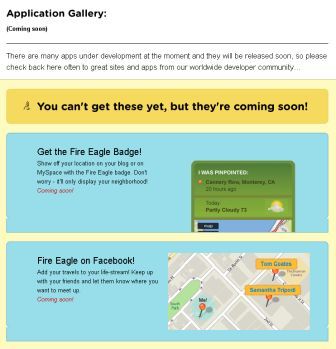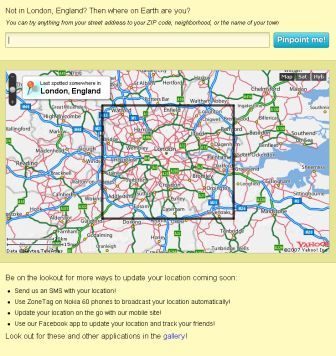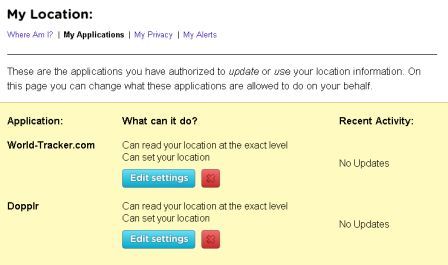First look at Fire Eagle – the Yahoo! location aware service
A few weeks ago I read about the new Yahoo! location initiative called Fire Eagle. Being a former practitioner in the Location industry, I rushed to the site, only to find I needed an invitation. Luckily David Recordon from sixapart (movable type) was kind enough to send me one. For those of you trying to get an invitation for yourself, my advice is to wait until there are a few more applications to try. At the moment, many things are “coming soon”.
Quoting from the public front page, the site says “Fire Eagle is the secure and stylish way to share your location with sites and services online while giving you unprecedented control over your data and privacy. We’re here to make the whole web respond to your location and help you to discover more about the world around you.”
First impressions – a good start. The site is designed with end user privacy in mind, and integrates Yahoo maps which is a given.
 The web interface is clean and easy to understand – but there is not much to do here (yet) as the screen shot on the left shows. There are a number of websites such as dopplr.com who already offer an API to Fire Eagle, as well as Danger Day who have an interface via Twitter (which I can’t get to work).
The web interface is clean and easy to understand – but there is not much to do here (yet) as the screen shot on the left shows. There are a number of websites such as dopplr.com who already offer an API to Fire Eagle, as well as Danger Day who have an interface via Twitter (which I can’t get to work).
I suspect there will be many more to come in the coming months. Mobile-tracker who (apparently) offer mobile LBS via the mobile operators also are offering a Fire Eagle plug-in but their location gateway was off the air for most of 2007, and they are no longer accepting registrations so I have no idea if they will offer carrier based LBS access to Fire Eagle.
Herein lies the issue. At the moment, the only way to provide a location update to Fire Eagle (which is essentially an aggregation tool, not a location engine) is to tell the application where you are (which is a manual process). Skyhook wireless offer an automatic way of doing this using WiFi positioning via a browser plug-in, but I have encountered some initial problems with the Loki positioning service.
When I get either the Vista browser plug-in or the S60 mobile application working I will post my experience.A couple of weeks ago I was speaking with a well known mobile operator who admitted to me that their location platform was just not suitable for mass market location services (that’s why they were talking to me).
As has been long known, most LBS network based cell-ID platforms around the world are only provisioned to handle single digit queries per second, as the location platform vendors charge the licence fees as a function of throughput, and most LBS services are yet to make any money. In contrast, SMS services have to handle 100s and even 1000s of messages a second. Also, as each location request consumes similar resources to that of SMS (network, SS7, airtime), most LBS services have to charge an SMS type tariff for each lookup.
So, if I want Fire Eagle or any other LBS aggregation or mapping service to update my mobile location on a regular basis (say every 5 minutes), then I have to pay someone a fee of up to 288 times the SMS charge (288 x 5 minute slots in a day) – which would be prohibitive. As mentioned earlier, the mobile network operators are also not in a position to offer this service from their existing LBS platforms.
Those reading this may be screaming back at the PC – USE GPS!! Well, GPS is not available in all handsets, drains the battery quickly and also still needs some sort of return path to deliver the GPS fix back to a server. For the majority of users who don’t have a GPS phone, another solution is needed. Please read my guest post over on msearchgroove.com on zone detection to understand how this might work.
Google have made an excellent start with their My Location feature bundled into Google Mobile Maps (see an earlier post on this). To do this though, Google have taken an operator-independent approach, and built a network database themselves for multiple countries. Theoretically, they could offer a live look-up service that could plot you on a map or a 3rd party site (unlikely to see this anytime soon on Fire Eagle though as this is a Yahoo! initiative).
So until the network operators decide to offer live location feeds at a reasonable price, or Google opens up their my location features via an API, most of us will be manually updating our location status in Fire Eagle. Even Symbian applications such as Jaiku only give location down to a country level most of the time.
Map integration
 The screen shot on the left shows the integration with Yahoo! maps. Here I manually told Fire Eagle that I was in London. This manual entry is pretty painful if I have to enter this each time I move. Even if I use Loki, it will only show my new position once I sit down with my laptop and connect to the internet. The time in-between each connection I am most probably NOT where Fire Eagle says I am. What is really needed is a live integration with my mobile phone, as discussed earlier.
The screen shot on the left shows the integration with Yahoo! maps. Here I manually told Fire Eagle that I was in London. This manual entry is pretty painful if I have to enter this each time I move. Even if I use Loki, it will only show my new position once I sit down with my laptop and connect to the internet. The time in-between each connection I am most probably NOT where Fire Eagle says I am. What is really needed is a live integration with my mobile phone, as discussed earlier.
Applications integrated with Fire Eagle
 This screenshot shows the installed APIs with world-tracker.com (does nothing at the moment) and Dopplr (which will ping Fire Eagle at the beginning and end of scheduled trips logged via Dopplr).
This screenshot shows the installed APIs with world-tracker.com (does nothing at the moment) and Dopplr (which will ping Fire Eagle at the beginning and end of scheduled trips logged via Dopplr).
It is on this page that I will be able to control how applications use my location information (even the location accuracy – here I have allowed my exact location to be shared, but I can also choose lower accuracy such as county, city or country to fuzzy things up a bit if I was paranoid about people knowing where I am).
The bottom line is that if you call me on my mobile and ask me where I am, I will probably tell you!
The read write web site also gives a good overview of Fire Eagle. It will be interesting to see when (and with what) Google counters this initiative. I think we will start to see more applications demanding real time mobile location information this year. Perhaps the mobile operators will start to be able to make a business case to make LBS pay.
As I am able to test more applications and how they integrate to Fire Eagle (I am travelling next week so we will see of Dopplr puts me in Moscow) I will provide updates here on my blog. 2008 could be the year that the demand for location aware applications based on the position of a mobile phone finally help LBS turn the corner – let’s hope so.